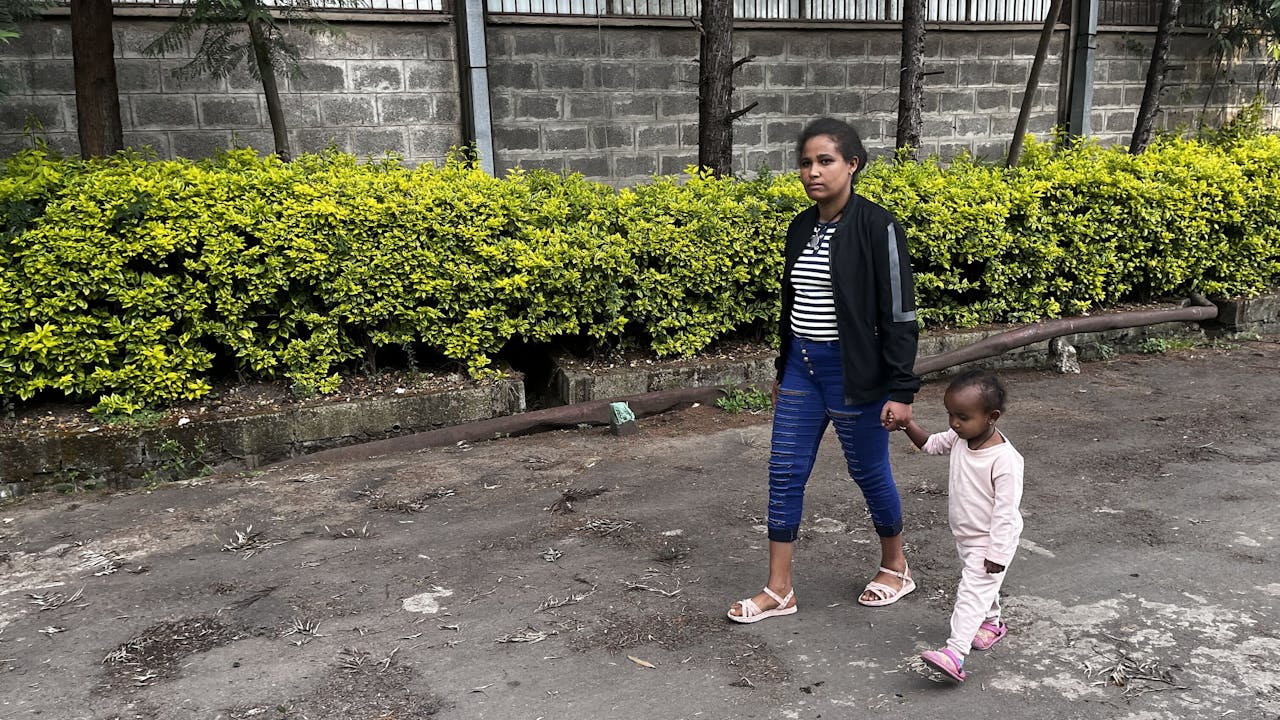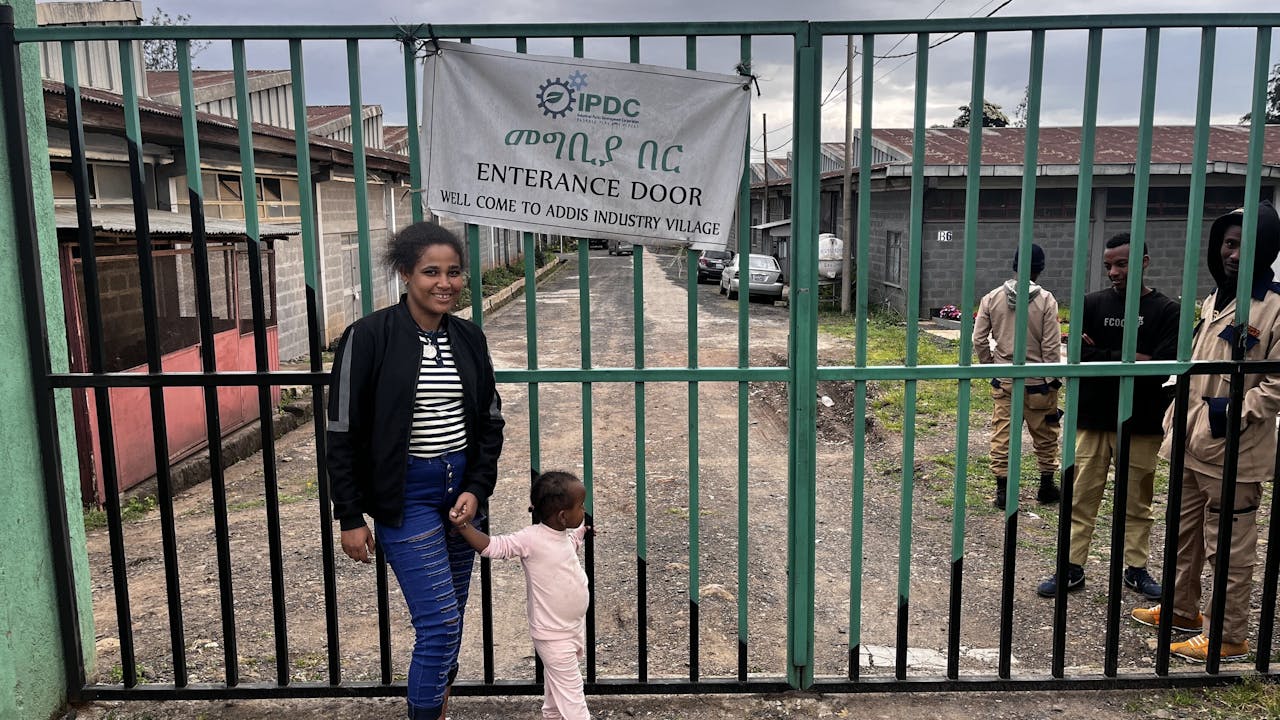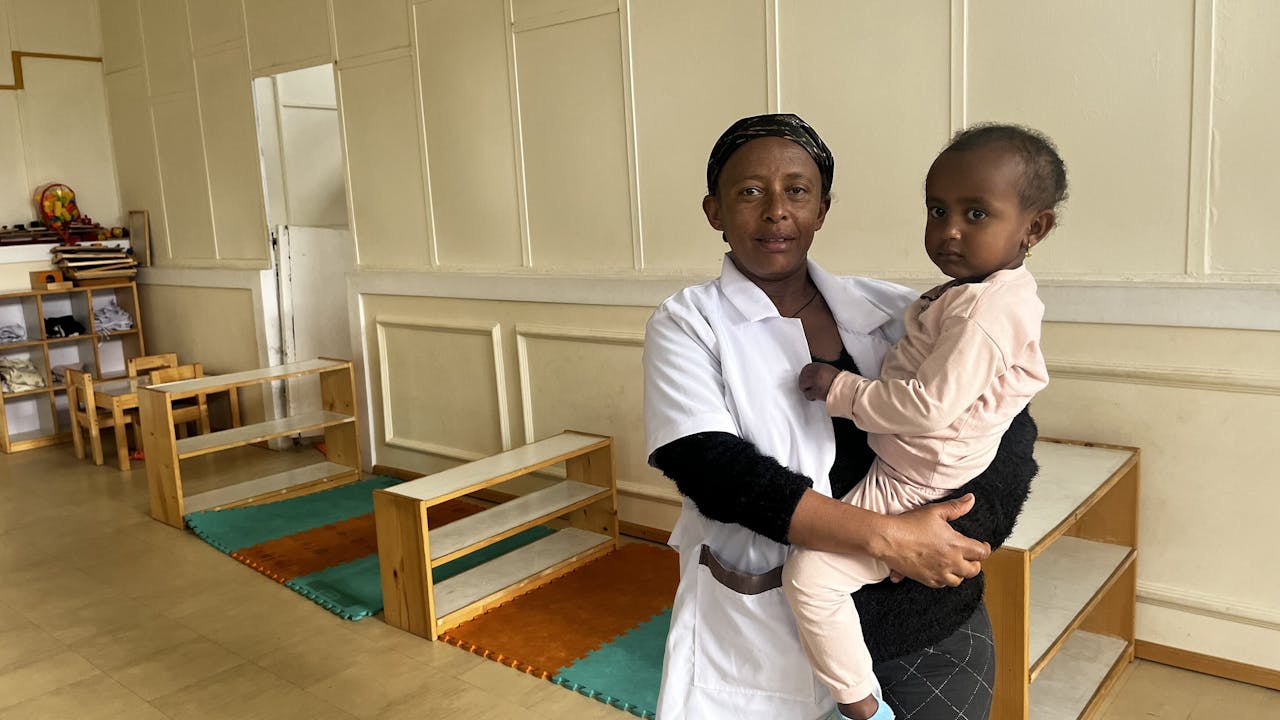When I had children, I had to stop working to take care of my family. But managing with only my husband’s income was extremely difficult. A job vacancy at a garment factory with a newly opened childcare centre, gave me an unexpected opportunity to return to work.
My name is Meseret Tamru, and I am 29 years old. I live in Addis Ababa in Ethiopia. I was born and raised in a small rural town in the Amhara Region. When I was young, I used to travel for an hour each day to get to school. By the end of 6th grade, I stopped studying.
When I was 22, I decided to move away from my small town to look for work in Addis Ababa. I went to the city with a friend who was older and had more experience than me. Back then, I was unfamiliar with the roads and the city. The journey was quite terrifying, but still, we were filled with hope for a better future.
In Addis Ababa, we went straight from the bus station to a local agent’s office to find work. After a few days, we found a family willing to hire us as domestic workers. Being a domestic worker was very hard, but as I didn’t know the city or have any other place to go, I had to be patient and persevere.
A while later, I met my husband. This was another turning point in my life. When I married, I left my job as a domestic worker and began working as an assistant at the local agent’s office.

I had a job before, but after giving birth, I stopped working and stayed at home for almost five years. Without an income, it was difficult to provide for my children and myself. (Ethiopia, 2024)
© ILO/OIT Homa Mulisa EjetaIn 2019, I gave birth to my first child at the age of 24. After that, I had to stop working to take care of my family as childcare was unaffordable for us. My second daughter, Kalkidan, was born in 2021. Her name means "Promise".
When I didn't work, it was very difficult to cover all our expenses with only my husband’s income. We had to pay rent, buy groceries, diapers, and clothing. Every month, we struggled to cover these costs. Our situation caused me a lot of stress. I was constantly hoping for an opportunity to return to work and help support the family.
It was very difficult to cover all our expenses with only my husband’s income... I was constantly hoping for an opportunity to return to work and help support the family.

Then, we saw an announcement for a vacancy posted in our neighbourhood. It was for a job at a garment factory with a newly opened childcare centre.
I was thrilled at the idea of returning to work. I could have an income and a place to take care of my youngest child nearby. This would make any parent happy.
I immediately decided to apply for the job. When I spoke with the garment factory management and explained my situation, they offered me the job on the spot.

Even though I always wanted to work and earn money for my family, I couldn’t because I had no one to take care of my baby. When this opportunity came, I grasped it with joy. (Ethiopia, 2024)
© ILO/OIT Homa Mulisa EjetaWhen I first visited the garment factory, I was really impressed. The childcare centre was very clean and well-organized. There were toys and napping areas and bathrooms for the children. It had everything that they needed. I could see that the childcare workers were taking good care of the children, so I had no worries about my daughter's well-being.
Since my daughter started going to the childcare centre, she has become more active. She spends time with other children, playing and talking. Also, she has started eating a variety of foods, which makes me very happy. Previously, she didn’t play much and only knew a few words like “mama” and “baba.” Now, she enjoys playing and knows many more words.
Getting the job was a huge relief. Now, I can earn a living while my daughter is close to me with good care. I had never heard of a facility like this before.

I can see my daughter during my breaks. It makes it feel like home for both of us. I am so happy now, because I am back at work, my baby is close to me and I know the trained childcare workers are taking good care of her. (Ethiopia, 2024)
© ILO/OIT Homa Mulisa EjetaMy job at the factory is tailoring. My tasks depend on the orders that we receive. Recently, I was working on T-shirts and now I am making different kinds of tote bags.
At the moment, I start work at 8am and go home at 5pm. The factory is only a few minutes' walk from our home, so it's very convenient. During my breaks, I can see my daughter. It really feels like home for the mothers and the children.
Prices are increasing now in Addis Ababa, so I am incredibly grateful to be back at work. But it’s not just about the money; I also feel more emotionally stable because I am working.
Prices are increasing now in Addis Ababa, so I am incredibly grateful to be back at work. But it’s not just about the money; I also feel more emotionally stable because I am working.

I am a witness to how these facilities can change lives. It is very important for mothers to get back to work. It's not just to earn money and afford necessities. It also reduces stress when you are able to provide enough for yourself and your family.
The enterprise also benefits from this because experienced workers can stay in their jobs. They do not leave because they lack childcare. I advise mothers to look for opportunities like these so that they can get back to work. I believe it would be really helpful if there were childcare facilities at other garment factories.
